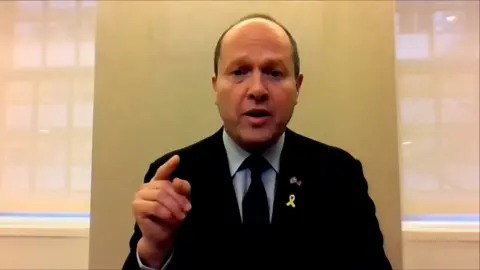In the aftermath of the tragic deaths of seven aid workers from the World Central Kitchen (WCK) in Gaza, Israeli Cabinet Minister Nir Barkat has categorically denied accusations of deliberate targeting by Israeli forces.
The incident has sparked international condemnation and calls for a thorough investigation into the circumstances surrounding the attack. WCK founder José Andrés accused Israel of systematically targeting his workers, alleging that the convoy was deliberately struck “car by car”.
However, Minister Barkat dismissed these claims as “nonsense”, stating that such actions would be contrary to Israel’s principles. In an exclusive interview with BBC News, Minister Barkat expressed Israel’s regret over the loss of the aid workers’ lives, attributing the incident to “friendly fire” amidst the chaos of war.
He emphasized that civilian casualties, including aid workers, are an unfortunate reality of conflict. The Israeli government has pledged to conduct an investigation into the incident, acknowledging it as a “grave mistake”.
However, Minister Barkat reiterated that there was no intention to target individuals providing humanitarian aid. The convoy, comprising three vehicles prominently displaying WCK’s logo, was struck as it departed from the Deir al-Balah warehouse after unloading over 100 tonnes of humanitarian food aid.
Despite the vehicles being armoured and clearly marked, all three were hit during the attack. The killings have drawn widespread condemnation from world leaders, with UK Prime Minister Rishi Sunak demanding a thorough and transparent independent investigation.
US President Joe Biden criticized Israel for not adequately protecting aid workers and civilians, urging deconfliction of military operations to prevent civilian casualties.
Responding to concerns raised by José Andrés regarding attempts to contact the Israel Defense Forces (IDF) during the strikes, Minister Barkat reiterated that targeting aid workers was inconceivable for Israel.
He emphasized the importance of distinguishing between humanitarian efforts and the actions of terrorist groups like Hamas, which he accused of intentionally attacking Israeli villages.
The incident underscores the precarious situation in Gaza, where humanitarian efforts intersect with ongoing conflict. As the international community awaits the outcome of Israel’s investigation, questions remain regarding the circumstances surrounding the tragic deaths of the WCK aid workers.
Amid heightened tensions and escalating violence, the need for humanitarian access and protection of aid workers in conflict zones remains paramount. As calls for accountability grow louder, the world watches closely for justice and transparency in the aftermath of this devastating incident.
This article was created using automation and was thoroughly edited and fact-checked by one of our editorial staff members

